Business
Learn how to maximize company health benefits while minimizing cost [Podcast]
Published
3 years agoon
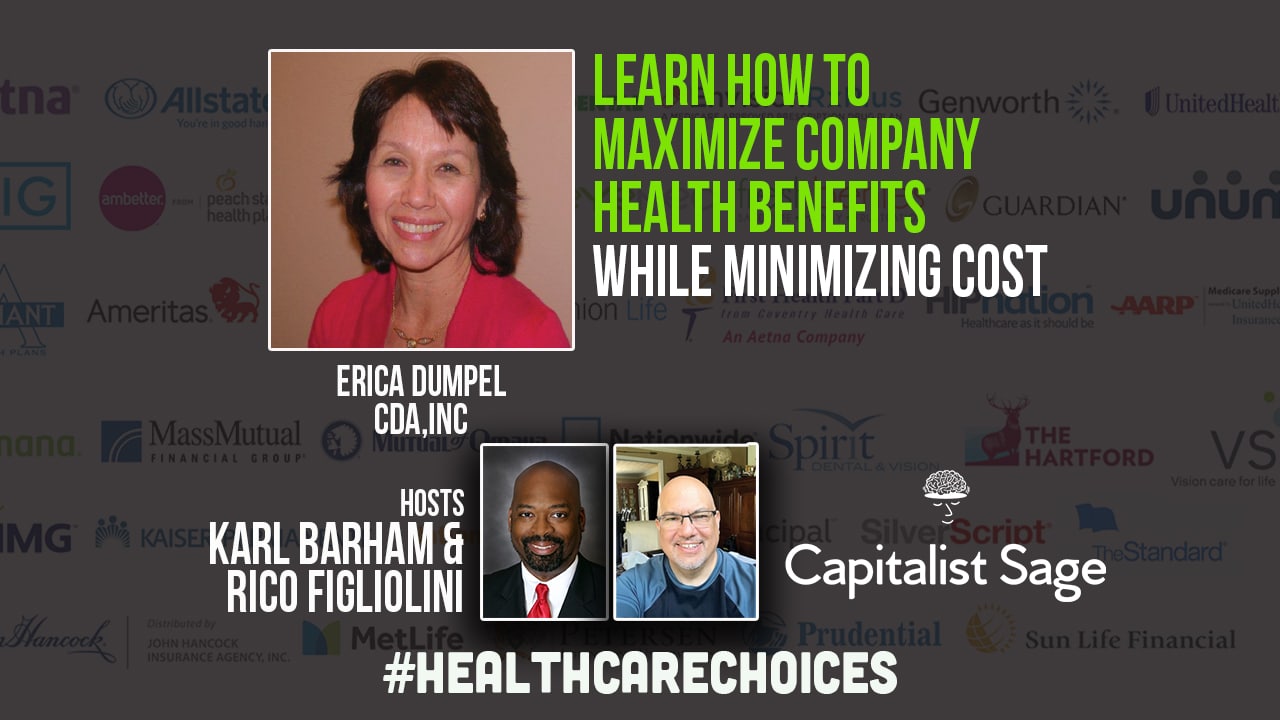
Health Insurance, for small business owners as well as individuals, can be difficult to navigate. There are tons of options in the market and outside of it, so where do you start? Our guest on this episode of the Capitalist Sage, is Erica Dumpel, founder of CDA, Inc., an insurance solution provider that helps both individuals and small businesses. She’s got over 40 years of experience in the healthcare insurance industry and she’s here to share some tips and information on how to make better decisions and start asking the right questions of your insurance providers.
With you hosts Karl Barham and Rico Figliolini
Resources:
CDA Inc. Website: http://cdainc.net
Erica’s Email: Erica@CDAINC.net
Business Phone: (770) 449-7369
Timestamp:
[00:00:30] – Intro
[00:02:11] – About Erica and Her Business
[00:02:58] – Group Coverage and How It Changes
[00:09:48] – Differences in Coverage Across the Country
[00:11:29] – The Affordable Care Act
[00:14:18] – How Employers are Handling Insurance
[00:17:18] – HMO vs. PPO
[00:19:15] – Physicians Outside of Networks
“If you sit down with a coffee cup on a Saturday morning and a yellow pad, and you go back and say, okay, last year, what did we use? What did we do? Pull up whatever checkbooks, credit cards, EOBs, whatever you have. Go back a year earlier, if it was different. Look forward. And I’ve told everybody, please ask your doctor what is on the horizon… We are saving people all kinds of money with a little bit of homework.”
Erica Dumpel
Podcast Transcript
[00:00:30] Karl: Welcome to the Capitalist Sage Podcast. We’re here to bring you advice and tips from seasoned pros and experts to help you improve your business. I’m Karl Barham with Transworld Business Advisors, and my co-host is Rico Figliolini with Mighty Rockets, Digital Marketing, and the publisher of the Peachtree Corners Magazine. Hey Rico, how are you doing today?
[00:00:47] Rico: Good Karl. I hope you’re well.
[00:00:49] Karl: I’m doing very well. We’ve got a rainy day out there today. It’s fall, it’s finally here. And why don’t you introduce our sponsor for today?
[00:00:59] Rico: Sure. Peachtree Corners Magazine, which we just put out our latest issue, is the sponsor of this podcast. Along with Peachtree Corners Life and Prime Lunchtime with the City Manager. So you can check us out on LivinginPeachtreeCorners.com or check out the Capitalist Sage website at TheCapitalistSage.com as well.
[00:01:18] Karl: Excellent. Well, today we are going to talk about health insurance and various options, especially for small business owners and individuals that are trying to navigate all these options in the market or with other plans. Today’s guest is Erica Dumpel. She is the founder of CDA, Inc., an insurance solution provider that helps both individuals and small businesses. She’s got over 40 years of experience in the healthcare insurance industry. And she’s here today to share some tips and information so that people that have to make decisions over the next you know, 90 odd days are informed with various options and at least start to asking the right questions of your insurance providers and the folks that help you with that. Hi Erica, how are you doing today?
[00:02:08] Erica: I am doing great. Thank you so much for inviting me.
[00:02:11] Karl: Oh, it’s my pleasure, my pleasure. Why don’t we jump right in and you share a little bit about yourself and what you do, and tell us a little bit about your business?
[00:02:19] Erica: We are a small business in Norcross, Georgia. We are a party of six, with a couple of dogs as extras, our security crew. Since 1975, we have had an agency that focuses on small companies, individuals, and seniors. So we work primarily with companies of less than 50 employees. Where sometimes individual products are appropriate, sometimes the group products are appropriate. And then we layer in there, all of the issues related to Medicare, because we have an increasing senior population that is continuing to work. So that has become an extra layer of conversation.
[00:02:58] Karl: Oh wow. I know that everyone this past 18 plus months, everyone’s health has become a critical point of discussion in family. And there are people that may not have had health insurance before, or had less health insurance, that are probably looking at the future differently than they have in the past. And so why don’t we start off with just talking about when you see individuals and small businesses, just high level, what are some of the options they have if they want to get better health insurance and healthcare?
[00:03:30] Erica: Let’s start with the groups, okay? So whether you are two people or 49 people, you are in a specific category called small group. You can do the guaranteed issue, affordable care act plans, which means they are cookie cutter. They are predetermined. The rates are the same, whether you are healthy or sick, whatever industry you are in. It’s a great starting point. Especially if someone has some medical issues in their group. If on the other hand, that same group of people can answer medical questions positively. There is an improvement in rates by going into medically underwritten coverage. The next level beyond that is, if you can do that and you can qualify for one of the programs that gives you an opportunity to get back any claims dollars that you haven’t used, that becomes even more attractive. And then there’s some other layers beyond that. But what we are finding now, and we have found it, the pendulum swings back and forth. What happens is, a couple of years ago, group rates were significantly less expensive than individual rates. Well, the pendulum has swung. And in the state of Georgia, individual rates are swinging more and more cost-effectively away from group. So all of a sudden we are talking to our employers, whether they are 49 or whether they are two and saying, does it make sense to unbundle the group product and look at an individual coverage, HRA? An ICHRA, you may have heard of that, or a QSEHRA is another one that’s out there. Does that make sense? Number one. Number two, does that get you away from some of the compliance issues? You put in a medical group plan and you have responsibilities that someone may not tell you about, or you may not be aware of how important this is. The penalties can be $110 a day times the number of employees, times the number of days since the infraction. These are real numbers. So we look at it from that side, then with some of our clients where some of the incomes are lower, and we’re talking the nonprofits and some of the nursery schools. What if we look at completely unbundling it? What happens if we help these people look at marketplace policies? Where suddenly now we have subsidies, which means we are able to reduce premiums based on income. If the incomes are low enough, you get that plus you get an improvement to a lower deductible, a lower out of pocket. And the employer rather than funding, or having to fund a portion of it, simply steps away. And says, Erica and her crew or whoever the broker is, is going to come in is going to do the guidance. Is going to do the education, is going to help with the enrollment. We are getting out of the group business right now because it is more cost-effective, it is better coverage for our employees. So that in a nutshell is what’s going on right now. And it is a busy time.
[00:06:22] Karl: Let me ask you some questions to see if I understand this correctly. If I’m an employer that have, maybe relatively low earning employees in my plan, and I want to offer some form of health coverage for them. Can you describe the name of that? The last one that you mentioned. And am I understanding it right where they can opt in? I can offer the plan, but I’m not required to contribute into it?
[00:06:50] Erica: You are not offering the plan, you are stepping away. You’re saying I have historically paid X dollars. I paid 200, $300 a month for everybody’s coverage. We either cannot afford to do that anymore. With COVID that has been a very common comment. Or we find that it’s not as cost effective. We have in particular a daycare center, the employee premium is going from four 40 to $480 a month for a $6,700 deductible. Okay? These folks are making very low income. If we take the employer out of the picture and say, we are dismantling the group. Okay, you are not going to pay anything. You are simply going to do steerage. We take the employees to the marketplace and determine as an example, Rico, you’ve got this age, this zip code, these doctors, these drugs, these family members. These plans make the most sense for you. Karl, you’re in a different zip code. You’ve got different needs. Everybody picks what they want. And it may be, Rico, you need a high deductible health plan. You don’t use this stuff much. Karl, you may have young kids running around. You may need co-pays. I don’t know. But you can finally fit the right product to the person instead of, and I’ve said for years, if I do my job right on a group product, everybody’s unhappy because I have to find the average. So here we finally have the opportunity to get the right fit for the employee.
[00:08:14] Karl: What changed to make that happen?
[00:08:16] Erica: It was the marketplace subsidies many years ago. Then those became less attractive. And now with the COVID, especially in the Atlanta market, we have more people looking for individual health coverage. We have carriers who’ve been here now, six carriers who have been here for a couple of years with good numbers. Good results. Four more carriers are coming into town and these are not small carriers. Aetna is coming in under the CVS banner. United Healthcare is coming in. Friday Health Plans is coming in from Colorado, they’re a good player. And Bright Health Plans is coming in, they’re already in North Carolina. So there’s an expansion of opportunity. But the biggest thing, so we focus on premiums, obviously the cost. We focus on the benefits, because if I can get you a lower deductible for the same or less money than you were paying before, you win. But the biggest change this year has been, these plans started as skinny HMO’s. So the reimbursement rate through the providers was very low. So doctors said, we’re not playing this game. We can’t afford to do that. So each of the plans had one or two hospital networks. So all of a sudden, I don’t know if you’ve noticed, but a lot of doctor practices are selling out to hospital groups. The Laureate Group is now owned by someone else. So everybody’s being bought and the Piedmont Clinic is expanding and magically those are all now participating providers under the hospital system. So our network has blossomed. That’s been our concern, is if I can’t find you the right doctor, then everything else is meaningless.
[00:09:48] Rico: Doesn’t it get a little, I remember when the ACA came through. There were, I think only three, insurance companies in the state of Georgia at one point. Because they didn’t want to participate. They actually left. I forget if it was United Health Care, one of them decided, that’s it I’m not doing it anymore. So now you’re saying that, I mean, most people that are, have gone through the system, north of 50 years old, figured that group insurance would be cheaper. Because you’re taking advantage and leveraging people. But what you’re saying is that’s not the case anymore. That I can go out, buy my own individual insurance. Yes, customize it to me, but it would still be competitive in the marketplace. Even if I don’t have a group behind it.
[00:10:33] Erica: It depends where you are in the country. And I found this wonderful map that goes from dark blue to dark brown. And the dark blue is where the group products are more competitive. And the dark brown is where the individual is. So if you’re in Texas, it’s this shade of blue behind me, okay. Don’t go looking for individual contracts there. The Savannah area, Macon and south, is a dark tan. The Atlanta market is a gray going into a nice shade of tan telling us that right now, this is the place to be. You’ve got to be fleet of foot. You guys are paying health insurance premiums, this stuff is heinously expensive. You know, we spend more time pricing our groceries than we do our health insurance. And how much does this stuff cost us to use? That’s the other part. It’s great, I have a $6,700 deduction. That’s like having no insurance for most of America. That’s a problem.
[00:11:22] Rico: Yeah. And especially if you don’t have copay or you’re paying per doctor visit and stuff like that. Yeah. I could see that.
[00:11:29] Karl: So I’m going to take this moment to re-introduce Erica Dumpel with CDA Inc. Health Insurance. Helping people find health insurance solutions. I want to kind of start back and maybe you could help me with the history. When Obamacare, which the marketplace, these terms we’re using them interchangeably. When that became available early on, I know there were fewer options of insurance. People were unsure about it. And they also, to be able to participate, there were certain requirements that had to be met to qualify for a marketplace plan. Are you saying now that the marketplace, there’s more plans available in the marketplace and you can customize them to yourself, but they still meet those initial requirements?
[00:12:17] Erica: I’ve done this for 46 years. So we were back to the hospital surgical days, before there even were PPOs and networks. What happened when the Affordable Care Act came in was, a bunch of companies got very excited and said, oh, this is a great opportunity. And so they came into the market. The Humanas, the Aetnas, the United Healthcare. They all jumped in. The Affordable Care Act, qualified plans had to meet certain requirements. They had to have the federally mandated wellness and preventive guidelines. So there are all kinds of little things that were required. What happened was, you could qualify for a marketplace plan or you could qualify for an ACA plan, period. I mean, you were buying a cookie cutter plan from originally 6, 7, 8 companies. You would qualify for a subsidy based on income. So they look at the family size, they look at the income and they say that your premium cannot exceed X percentage of your income. If you are between 250 and 400% of the federal poverty level. There were different buy downs on and on. Fast forward to the COVID issue. The government realized we had a whole bunch of people running around with no insurance because they couldn’t afford it. So not only did there appear or does there appear to have been an increase in the subsidy amount that people are getting, but where everything seemed to stop at 400% of the federal poverty level, now it’s going beyond that. If you are above 400%, you are not going to have as big a help. But you’re still going to have some help, if the premiums exceed a certain percentage of your income. So it’s an effort by the government, in my opinion, to get as many people covered as possible. The more people we have who are not showing up at emergency rooms or at hospitals without a negotiated network, the less the rest of us are going to be paying for their costs that are being written off and passed onto the rest of us.
[00:14:18] Karl: Got it. So in the scenario that you described where employers don’t offer group plans, is it the idea that they can offer them some kind of cash bonus credit or something as they choose their own to help them offset their costs? What do you see employers doing? Or are they just stepping away from it completely?
[00:14:37] Erica: Many employers, I suspect are just going to step away completely. Our clients are not like that. Our clients are taking those dollars and saying, okay, rainy day. Because in two years, this all may shift the other way. So let’s kind of bank that for the moment. But let’s look at things that individuals cannot purchase cost effectively. Dental, vision, disability products. You cannot buy a cost-effective disability product. But on a group basis, it’s pennies. Life insurance, cancer, accident. All of those workplace products become an uninteresting thing. In some cases, some of our employers are saying we are not allowed to pay for the health insurance, but we can bump. This guy has been with me for 15 years, I’d like to give him $300 a month. This fellow is brand new, I’d like to give him a hundred dollars a month. I’m just going to raise the salary, and make it clear to them that it is because of this. At some point, we may need to take this money back, if we go back into the group business. Please don’t forget why you’re getting this money. Because that’s very easy to forget, unfortunately. A lot of companies right now are fighting to attract and retain their employees. So anything that improves a situation, maybe saves a little money for the employer for a rainy day. Maybe allows, I don’t know, a bigger Thanksgiving dinner or whatever. I don’t know. There are all kinds of things that can be done with those dollars.
[00:16:02] Rico: There’s a friend of mine. His company provides group insurance. But he’s also told his individual employees, if you don’t want to be on this group insurance, this agent that I use, this company to use, can provide options for other insurance that you can purchase separately. Now he’s not bumping salaries per se to cover that, but he’s giving options. Because he’s saying you may be able on your own to get it cheaper than what I’m able to give to you as a group. Because like you said, everyone’s a little different, right? It could be a 25 year old working for him versus a 40 year old with two kids.
[00:16:39] Erica: The thing to be careful of is, when the employer says, go work with this broker and go get a subsidy. Okay? So we have to be very careful. One of the kick outs is if you are eligible for coverage under a group plan through your employer or any other employer, to whom you are affiliated, spouse as an example, you cannot have a subsidy. And what’s happened is that people were not told that or are gaming the system. At some point, they’re going to get caught on that. And there will be certainly a return of that money. Certainly there’ll be some kind of penalty. Right now, not. But in the future, there’s going to be some kind of penalty for that.
[00:17:18] Karl: So I’ve got another question about the, in Georgia locally here, the options in the marketplace, ACA. Most of them in 2020, I remember seeing something. Over the last several years, they’ve mostly been HMO options. I don’t know if there was many PPOs and then there might’ve been a few HSA, high deductible HSA plans. In this coming, do you have any insight of is there any change in options for folks? And just generally your thoughts on the pros and cons of HMOs versus PPOs when people are trying to select what’s right for their particular situation.
[00:17:52] Erica: Everything on the individual market is an HMO. So that simply means that unless you have a life or limb threatening emergency, you need to stay in your network. And generally it is a hospital driven network because a carrier will have a relationship or a contract with North Side and Emory, as an example. So we do not have PPOs in this market and we have not in a very long time. There were point of service plans for awhile. They do not exist on the individual side right now. I don’t see them coming back. The big risk with the point of service that people, I don’t think really understand, is if I go to a non-participating provider. Yes, I have a separate deductible and yes, I have a higher co-insurance amount. I see that. What I don’t see is, what the accepted rate, the usual and customary, the negotiated, whatever you want to call it is. So if I go to a non-participating provider and that doctor runs up a thousand dollar bill, and my plan is going to pay 60% and I’m going to pay 40%. It’s not necessarily of that thousand dollars. If a participating provider would have accepted $150, I will get 60% of the 150. The rest of it is all on me. So that’s the big concern with the point of service plans.
[00:19:15] Rico: Is that because when you get explanation of benefits, the doctor’s bill is $1,500, but the contracted or agreed upon by the insurance could be a thousand dollars. And by the way, we’ll pay 60% of that. And you’re responsible for the other 40 of that discounted rates.
[00:19:31] Erica: That’s if you’re in network. If you go out of network, you now get a $10,000 bill negotiated down. And the in network would have paid, would have negotiated a thousand, but you’re getting 600 on a $10,000 bill. That’s the trick. And that’s where people get caught.
[00:19:49] Rico: Yeah. My daughter was in Berry college. She got hurt. She fell off a horse, equestrian rider. Had to go to Rome’s emergency hospital room out of network. I mean, had to go. That was the only hospital in the whole place. And then we get a bill like a month later, I think it was. And it was just horrendous. I mean, nothing happened with her. She just needed a scan to make sure everything was okay. But yeah, it was not good.
[00:20:13] Erica: But it should have been in network because it was life or limb threatening. So was it coded properly? I just joyfully walk into the Rome hospital cause I happened to be there, versus I just fell off a horse. That’s a whole different feeling, so that should have been treated in network, but that brings us to a whole different issue. There are, in the participating hospitals, physicians primarily radiologist, pathologist, and anesthesiologists, who are not participating. And those are the surprise bills. You may have had a surprise bill. That’s what all the legislation is discussing now, because what are you supposed to do? You can’t ask? I don’t know who’s the anesthesiologist, you know, when I’m getting my head cut open. I don’t know. So that’s going to be a real interesting discussion
[00:21:02] Rico: Because they’re individual like subcontract. This is the way I looked it. The hospitals, the shell, they like the hair salons. They have a chair and they need to make money. And that’s what they’re doing. And you’re right. And I think that was part of that issue was the, it was that part of it that really got us.
[00:21:17] Karl: If I could ask you then, what do people do about that? If you need to go for a procedure for something, are you supposed to ask? What’s best practice? Ask, is everybody that’s providing medical care to you during your surgery and post-surgery in this plan? Or how do ordinary people avoid getting those surprises?
[00:21:39] Erica: Most of it when you pre-certify a surgery, and if it’s an emergency obviously it’s a whole different story. But if I pre-certify a surgery, I’m going to the insurance company and saying, I’m having this done. And checking is the surgeon in, is the assistant surgeon? Because that’s where the problem is, the assistant surgeon. Is the hospital? You can’t really check the anesthesiologist. So that’s a big problem. But I have one client who delivered a baby. And it was about a month or so after a friend of hers that delivered a baby. And the husband took it upon himself to not have the same mistake that their friends had. He stood at the door, the entry to her room, and everybody who walked in, he asked, are you a participating provider? Because his, their friends had gotten hosed. Because every time a doctor sticks his or her head in, cha-ching, there’s a bill. So that’s the extreme, but they were so proud of themselves because they had no surprise bills.
[00:22:33] Karl: That’s fabulous. I could see someone making a shirt for that as they come in and have people sign in. I’m pretty sure that’s not how healthcare is supposed to be for most people. That’s the world that we live in. If I can come back to when you look at the options, you had mentioned new providers coming in? I don’t remember who was in last year, but there were, maybe there were more than the year before. Are there more options coming in this, do you have any insight into that yet?
[00:23:02] Erica: We had the core six, which was Ambetter, CareSource, Anthem Blue Cross, Kaiser. I’m blanking out. Oscar and somebody else. This year being added in, oh, Allied. This year, being added in are United Healthcare, Aetna as CVS. I don’t know who bought who, but they’re under CVS now. Bright Health Plans, and Friday Health Plans.
[00:23:24] Karl: Now, can I ask a question? How do people navigate, they change jobs or they move or change. They have a doctor that they like that’s in one plan. The kids have another doctor in another plan. Everyone has doctors. Either they’re dealing with chronic stuff or things that have been going on for awhile, and then they have to change insurance providers with different groups of these groups. How do people, how do you suggest people navigate that?
[00:23:54] Erica: It’s a difficult thing, especially when we have, call it skinny networks or call it limited doctors lists. In the old days, if you went from an employer plan with Aetna to an employer plan with Humana. Yeah, it was the same doctors. It was no big deal. What we’re finding now is if I’m in a plan that has a Piedmont base, it’s going to be a different set of doctors than a North Side base. So you have to be oh so careful. If someone is in the middle of something, very extensive cancer, heart condition, whatever. Many of the plans will allow that particular problem to finish with the existing doctor, as long as there’s notification. But then you do have to switch from one provider to another. And that’s a problem. So this year I’m with this pediatric group and the next year I’m with that pediatric group. And the lock-in to a doctor is a real problem. I got lucky. I found a doctor who takes everything and it’s just an incredibly wonderful old fashioned doctor. But when you’re in these practices that sell to or sell out to a hospital chain, they’re only going to be in one hospital. It’s a system. That is going to be a big problem.
[00:25:01] Karl: Got it. The other thing is in, when they’re looking at it, the different levels, gold and platinum and silver and blue and all the different levels that people have. Any thoughts on, differences between? Is it just about the dollars? Are they really worth that being distinct from each other?
[00:25:19] Erica: It depends on very specifically on what your needs are going to be for the next year. So a gold plan is going to have a higher reimbursement on your expenses than a silver or bronze or whatever. So those actuarial levels were all calculated. If you qualify for subsidy, start by looking in the silver plans. Because that’s where you may get your best bang for your buck. If you are below a certain level of the poverty level, you get that improvement in benefits, is what I call it. They have some other term, but your premium comes down. You’re out of pocket comes down, potentially. If you are very young and you never use this stuff, and there’s a young woman who called me and we’re working on her stuff right now as a Guinea pig, we have the opportunity to put in a catastrophic policy. And the thing is going to have an $8,500 deductible. This child is 26 years old, but she’ll have all of her preventative stuff covered and three primary care office visits. She doesn’t have anything. This is perfect. And the premium is $206 a month. She can afford that at that age. If I have a bunch of kids running around with antibiotics and tubes in their ears and constant this and that, I’m going to need to get a richer plan. But if you sit down with a coffee cup on a Saturday morning and a yellow pad, and you go back and say, okay, last year, what did we use? What did we do? Pull up whatever checkbooks, credit cards, EOBs, whatever you have. Lineup all the people in your family and figure out who did what. Go back a year earlier, if it was different. Look forward. And I’ve told everybody, please ask your doctor what is on the horizon. Sometimes people are just in denial, but if I’m carrying a lot of weight and I have blood pressure problems and I’m having trouble losing that weight, I’d better be aware that there’s something on the horizon for me. If I have diabetes and I don’t have it under control, what is the next level of insulin I’m going to? What does that cost? Nevermind, what can I do to push the time backwards? Bring it down to scale, but you need to be aware of how much you use it. The advantage is every year you can make a change. We are no longer medically underwritten. So the fact that you do get sick, next year, go ahead and change. And same thing with the Medicare folks, with their drug plans, oh my gosh. They need to every single year, look at their drug list and compare it in terms of what their plan is this year to what it could be next year. We are saving people all kinds of money with a little bit of homework.
[00:27:46] Rico: I mean, some insurance companies don’t want to cover certain medications. They might cover the generic. They might decide to cover the brand, but not the generic. I’ve seen that. I’m an individual business owner, right? Just me. I don’t have, I have 1099 employees, if you will. They’re subcontractors, freelancers and stuff. I would be looking at an individual policy then, versus a company policy or group policy, because there’s just me. So no different than anyone else that would be looking for themselves, pretty much. The way it used to be.
[00:28:16] Karl: What about outside of the marketplace? Who would you recommend look outside the marketplace? I understand if you have pre-existing conditions and so on, but when is that a good option for individuals, small business owners?
[00:28:31] Erica: The marketplace has all 10 carriers. In the Atlanta market, okay? Has a series of products with a pricing structure. If you are going to look for a subsidy, you have to enroll through that and get your subsidy there. On the other hand, if an employer is putting in an ICHRA, in individual coverage HRA, where they are more involved and they’re saying no, no, we still want to manage this. We just want everybody to have their own choice. There we have to be careful because standing alongside the 10 carrier marketplace plans, are 10 carrier non marketplace plans. So they’re going to be usually a little bit richer, a little bit less expensive because you can’t get the subsidy on it. But the trick now is if I put in an ICHRA, and I want my employees to be able to pre-tax their portion of the premium because now I’m paying a part of it, I have to make sure that the decisions and choices are made off the non marketplace policies. A lot of people don’t know that I’m just waiting to see what blows up next year on this, because they’re going to say Johnny went over to the marketplace and they signed up and it looks the same as off marketplace. Different coding, different rules. So it’s a little bit more complex than people realize, but the difference between the two is marginal. But it could be that the non marketplace plans could be a little richer and a little less expensive. They were this year for some carriers.
[00:29:56] Karl: So if you could share some of the dates that are coming up, I know enrollment periods are starting. Can you highlight some of the key dates people should pay attention to?
[00:30:04] Erica: Medicare open enrollment, which is for Medicare Part D Drug Plans and Medicare C, Medicare Advantage Plans, October 15th through December 7th. Unless you have a qualifying event, which means you’ve lost coverage or something else, that is your only window for a January one effective date. And you are locked in for 12 months, essentially. There are some parameters, but consider you are locked in for 12 months. The individual marketplace starts November one, next Monday. And for everybody who enrolls between Monday and the 15th of December, they will have a January one effective date. And that’s where it stopped last year. This year, the government is expanding it an extra 30 days going to January 15 for a February one effective date.
[00:30:51] Karl: Got it. Got it.
[00:30:51] Erica: Those are your key things. For many people who have group plans that seem to enroll, or it seemed to renew January one, which is a large proportion of the United States. Right about now is when everybody’s being handed their open enrollment packets and being told, make your decisions. So again, doing the little exercise, getting the yellow pads, sitting down and figuring out how do we use this stuff? In the past, you would want to get the richest plan you possibly could, because if you got sick, you could not make a change. Those days are gone. So now, what size shoe do I need this year? What size shoe do I need next year? And what size shoe did I have last year? So we really need to start paying attention to how we spend our money, premium wise and claims wise.
[00:31:36] Karl: Wow. Those dates are coming up quickly. But that’s some good tips as far as starting to look at your past spend and asking the questions of what your future spend may look like depending on your family situation, there’s pregnancies or dealing with knee surgeries or back surgeries and things of that nature. It’s the right time to make those decisions. I know there’s a lot more we can cover and talk about. And I’d love to have you back again and we can talk some more about different changes as things evolve. But if someone wanted to reach out to contact you, what’s the best way to reach Erica?
[00:32:11] Erica: Easiest, probably is my email. It’s Erica, Erica@CDAINC.net. And the office phone number is (770) 449-7369. There are six of us here, support staff and sales reps. Anybody can get the conversation started, whether it’s group or individual or Medicare, it doesn’t matter. We’re happy to help any way we can.
[00:32:37] Karl: Well, excellent. Well, it’s the fall season and going to fourth quarter, which I could imagine is a, busy time for you. Do you have anything coming up? What do you got keeping you busy this next few months?
[00:32:47] Erica: Exactly what I just discussed. Seeing a lot of clients and a number of folks who have been referred to us are coming with questions. Because there’s a lot to digest this year. More than in prior years, there are a lot of options. People really need to take a peek at what their options are because this stuff is incredibly expensive.
[00:33:08] Karl: I’d also like to add a shout out to the Southwest Gwinnett Chamber Friday coffees. You come there, you’ll meet folks like Erica. Several other folks that can help you through insurance issues and other issues for your business or for your individual self. Stop by on a Friday at 8:30 in the morning for Friday coffees with the Southwest. And Erica, I know you’re often there and that’s a good way to meet her and some of the other folks that work in this space. I want to thank you so much for joining us today and just helping with tips and helping people become more aware and every time Rico, we do this right, we learn something else.
[00:33:44] Rico: This was great. Thank you, Erica.
[00:33:46] Erica: You’re very welcome.
[00:33:46] Karl: We’re all just a little bit smarter about, just the options and the decisions that we have to face. Open enrollment is starting up soon. I think November 1st for most people. Do those exercises, talk with your families, talk with your employers about some of the plans that are outside the marketplace. And just try to do the best thing for your family. If anything, we learned over this last year is taking care of your health is really important. And you can’t plan for when you’re going to need health insurance and deal with it. All the people that got COVID, whether they have to get well at home or go out and go to a hospital. And there’s going to be some time before people recover from the health costs that were incurred. The costs to their livelihoods, their employers and so on. So it’s a smart time to think about what choices you’re making for next year. And Erica, thank you so much for helping us through that. Today we had Erica Dumpel with CDA Inc. Just sharing some of those insights on the healthcare options for folks that are out there. I’m Karl Barham with Transworld Business Advisors of Atlanta Peachtree. Our business advisors are available to help you consult on your business. Whether you’re looking to improve your business, to grow your business, or when you’re ready to exit your business. You can contact and schedule a consultation with us. My email is KBarham@TWorld.com. Or you can visit our website at www.TWorld.com/AtlantaPeachtree. Our goal is to help support the local business community in any way we can. Even if it is connecting them to experts in different areas that can help them with their business or when they’re ready to exit or sell their business, we can help them with that as well. Rico, why don’t you tell us about what you’ve got going on?
[00:35:31] Rico: Sure. We’re working on the next issue for Peachtree Corners Magazine. That actually comes out in December. But we just started working on editorial now. Lots of good stuff we’re planning on. And the latest issue is out now. You can go to LivinginPeachtreeCorners.com to check out the digital version of that. And doing the normal things that I always do. Mighty Rockets is my company. So if you’re looking for branding, marketing, social media, online management of your presence there. Just contact us and we’ll be more than happy to help you with managing your social media, video production, and podcasts even. So check us out at MightyRockets.com. So all good. It’s a great day. It stopped raining too I think.
[00:36:14] Karl: Yeah, it did. Well, thank you everybody for joining us on the Capitalist Sage Podcast, we’re going to continue to bring you local experts and business owners and just continue the conversation. So everyone have a great rest of the week. And for those get ready for Halloween this weekend. Be safe out there and watch out for the kids. Take care of everyone.
[00:36:33] Rico: Take care.
Related
Business
The Forum Gives Sneak Peek of New Eateries and Community Spaces
Published
2 days agoon
July 24, 2024
If you’ve been to or near the Forum in the past few months, you’ve probably noticed cranes and construction crews. The anticipation of the first phase of renovation of the 22-year-old retail center has left a lot of Peachtree Corners residents as well as nearby patrons excited to see changes.
The Forum administration invited the media for a hard hat tour on July 17. The event showcased the redevelopment progress ahead of The Plaza’s grand opening on Aug. 8.

Scrumptious bites incoming
Executives from the development and leasing teams joined on-site management and led attendees around the new central gathering space, guest amenities and Politan Row, the newly created 10,000-square-foot food hall.
Dining concepts from veterans at Sheesh, Twenty-Six Thai and newbie Gekko Kitchen were the first food vendors announced for the space, which is expected to open in January.
“We can’t wait to introduce the Peachtree Corners community to our food hall experience,” said Politan Group CEO Will Donaldson in a news release. “Every detail from the design to the bar program to the cuisine is thoughtfully curated to inspire guests to not only mingle with one another but to connect with our incredible restaurateurs and discover new favorites.”
During the tour, Donaldson explained that eventually there will be seven different global cuisines in the Politan Row food court at the Forum featuring well-known and up-and-coming local talent. Once complete there will be a central bar, a private event venue and a covered outdoor patio.
“One of the things that we’re excited about is this unique design that we’ve come up with, that’s very specific to this area,” he said. “We’ll be open seven days a week for lunch and dinner. Whether you’re with a group for lunch or with your family, it works great for multiple settings.”
Twenty-six Thai owner Niki Pattharakositkul said the restaurant will work with local vendors to source the freshest meats and produce possible.

“There are certain types of produce and protein we try to source locally, but sauces and the more exotic produce and herbs, we have to import from Thailand,” she said. “Our brand is trying to move towards doing things locally and sustainably.”
Working with organizations such as Georgia Grown limits the use of large food distribution companies. Since starting Twenty-six Thai in 2016, Pattharakositkul has launched seven locations across metro Atlanta, including at Politan Row’s Ashford Lane and Colony Square.
The eatery describes itself as an “authentic wok-fired Southeast Asia-inspired menu featuring items such as pad Thai, pad see ewe and classic drunken noodles.”
Sheesh, a Mediterranean concept that uses simple, wholesome ingredients prepared with unique spices and blends, is run by corporate executive chef Charlie Sunyapong and director of operations Raquel Stalcup. The two are also members of the group behind full-service restaurants Stäge at Town Center and Pêche at the Forum.
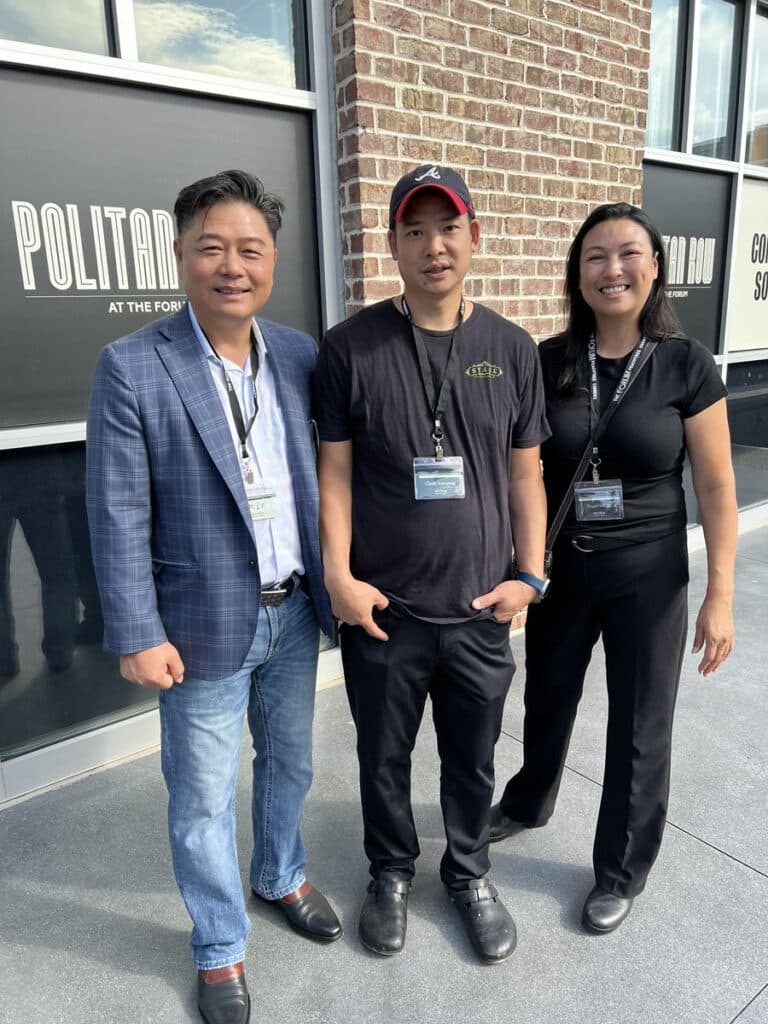
The popularity of those suburban concepts has already taken off. With Sheesh, they’re looking to do something different.
“There are going to be some things that are unique to Sheesh that you’re not going to get at the other places,” said Sunyapong. “You’re not getting a whole restaurant; this is quicker fare.”
Gekko Kitchen, a former food truck transformed into a hibachi and ramen experience, will be serving fresh, fast bowls that are more colorful and lighter than traditional hibachi fare.

Gathering spots
Development Manager Nick Lombardo explained that NAP is moving away from building big construction projects from scratch like Colony Square in Midtown Atlanta and Avalon in Alpharetta.
“As a company, North American Properties pivoted around 2020 from building big ground-up construction to more redevelopment with already existing properties,” he said. “With the thought of great assets that just need a little more attention Infused into them to create value, we bought the Forum in 2022.”
He said that value-add propositions done at The Forum will create a more walkable center.

“Trying to compete with the internet on convenience is a very tough task, so the way we differentiate is by experiences,” he said. “We host between 150 to 200 events every year. We have things like concerts, wellness and fitness events and we have child playtime events. Our marketing team does a great job and they’re the differentiator when it comes to what makes our property stand out.”
By the first week of August, a large gathering space will be unveiled in the central area of the property between Pottery Barn and seafood restaurant Pêche. It will have a nine-foot LED screen capable of hosting movie nights and sports viewing. There will also be musical performances featuring local artists.
“We’re not in competition with Town Center,” said Charlotte Hinton, marketing manager at The Forum. “Town Center has gates like a real music festival and we’re more like a ‘chill and enjoy the music’ vibe where you can grab a beer and hang out or maybe kind of walk around.”


The smaller space and artificial turf are unlike the Town Center space where attendees spread blankets and bring chairs. The Forum will have furniture and seating in the space so folks can just gather and either enjoy time with family or partake in events.
The Forum will also offer valet parking on a limited schedule at that end of the property.
More improvements
Although the construction equipment will have moved out, the jewel box building will house a yet-to-be-named restaurant that will open early next year.
“We’re pretty much done with what we’re doing as far as landlord work,” said Lombardo. “We ask our tenants to bring their brand and their design and their material pallet and put that on the building to express their brand identity. They know their brand better than we do. They know how to best design their building and how it functions and works.”
It’s the same process with retail stores, he added.

“We always ask all of our new tenants to come in here when they’re building their storefront,” he said. “They’re not just selling their clothes; they’re selling a lifestyle in the brand so we ask them to push their brand out to the street.”
Even with the new spaces, there will be no shortage of parking, Lombardo added. “There’s plenty of parking behind these buildings,” he said pointing toward Pêche. “What we’ve done is enhance the connectivity to those areas. We’ve redone this breezeway and we’re adding lighting and connecting the parking lot to the main boulevard here. The goal is to replace cars with people and activity and bring a sense of community to the property.”
Related
Business
Taste of Peachtree Corners: PCBA Showcases Local Restaurants
Published
1 week agoon
July 17, 2024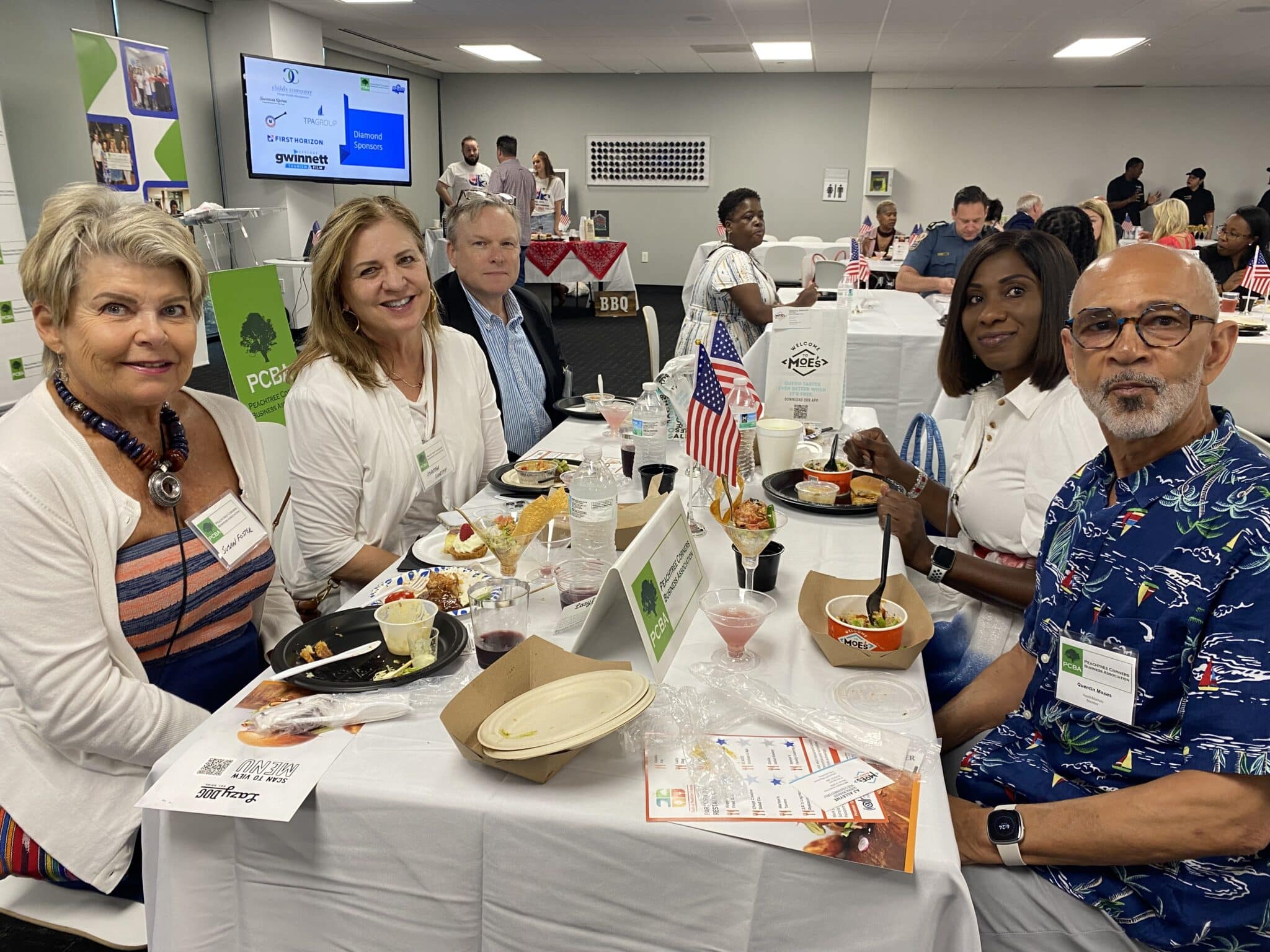
The Taste of Peachtree Corners has been in the works for years, but the COVID-19 pandemic put many key events on hold for the Peachtree Corners Business Association (PCBA).
But luckily this year, the dedicated staff of volunteers successfully executed a memorable event and introduced a lot of local business owners to their neighboring restaurants and caterers.
As I walked up to the Community Chest Room at Peachtree Corners City Hall on June 27, there was a line outside the door. I later found out that over 100 people had registered to attend the event. I got checked in quickly and was faced with a “passport” of 10 Peachtree Corners restaurants serving everything from high-end bakery items to good old-fashioned barbecue, and modern twists on seafood and American cuisines.
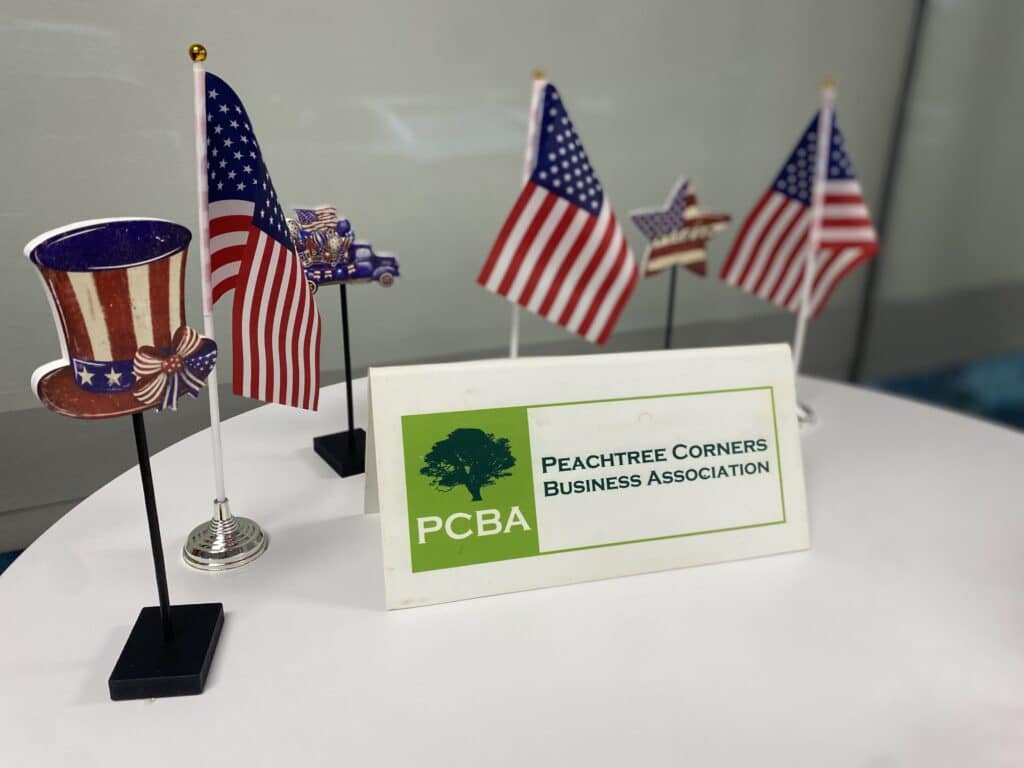
Let’s talk about the food
The idea was to visit all 10 restaurants and collect stars while trying samples and small plates. My first stop was Firebirds Wood Fired Grill, and they had my favorite – homemade chips and queso. The queso was smoky and mildly spicy with a great depth of flavor. What a great start. Next up was Chopt. Creative Salad Co. I had never heard of this restaurant before, but they blew me away with a perfect amuse-bouche of cherry tomato, pesto, mozzarella, and olive oil. These guys understand simple and fresh Mediterranean flavors.

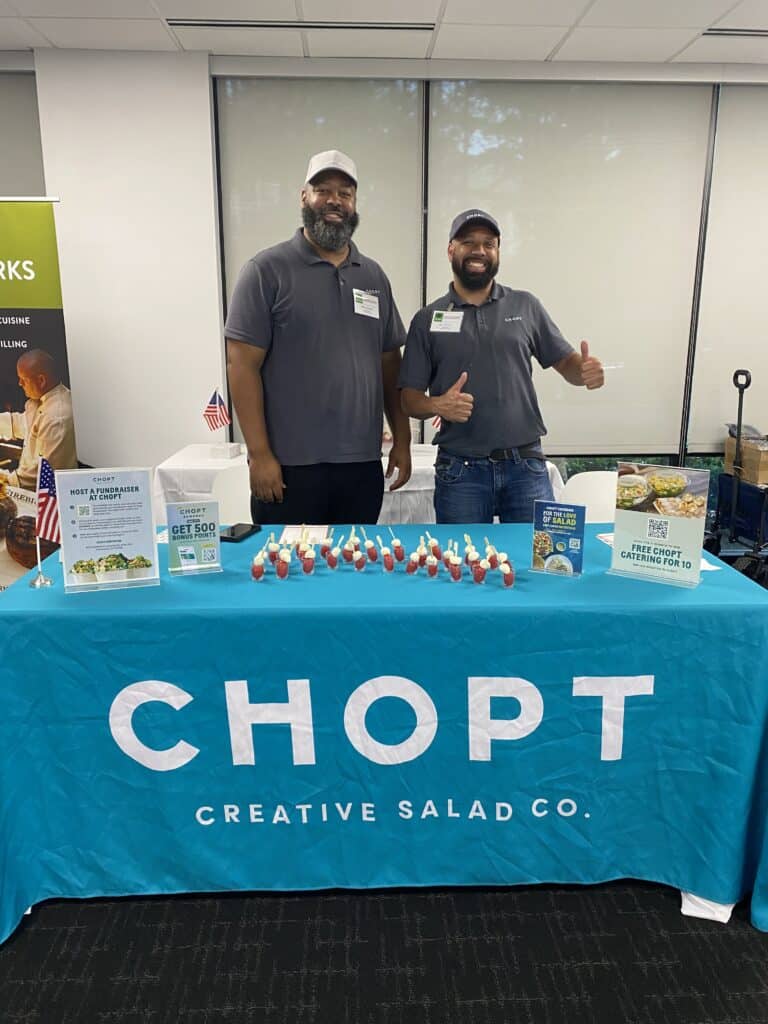

The folks from Marlow’s Tavern were also on-site serving shrimp and grits with jalapeno, spinach and tomato beurre blanc. This is definitely the style of elevated food I’ve come to expect from Marlow’s. And as a nice touch, they prepared a refreshing blueberry cocktail.


Another familiar face was set up on the other side of the room. J.R.’s Log House Restaurant served southern favorites like pulled pork sliders, baked beans and mac n’ cheese. I couldn’t pass this one up. The pulled pork was tender, tangy and saucy. Exactly what I want from a barbecue. Lazy Dog’s table really impressed me with its presentation. The tuna cup with rice, avocado and chili with chips on the side, was a real stunner.



Moe’s Southwest Grill was also on-site handing out tasty tequila lime chicken with rice, avocado, and black beans. This super hearty and comforting entrée was followed by a seafood course from PECHE Modern Coastal. Crab cakes with a croissant pinwheel, roasted garlic and lemon aioli and arugula were on the menu and the flavor combinations were simply fantastic.


PECHE’s sister restaurant STAGE Kitchen & Bar was next door offering a tuna and salmon tostada with avocado, eel sauce, spicy mayo, and cilantro. This was easily one of my favorite bites of the night. The tostada was crunchy and light with clean and bright flavors. No kidding, I could probably eat this every day for lunch.


I moved on the Smoke’s Family Catering and owner Phillip Smoke had whipped up enough barbecue to feed an army. I had the pleasure of trying the smoked chicken with potato salad and it was the perfect pairing. Last but not least: dessert. I capped off the evening with a beautiful chocolate ganache-filled croissant with perfect lamination and flaky texture.

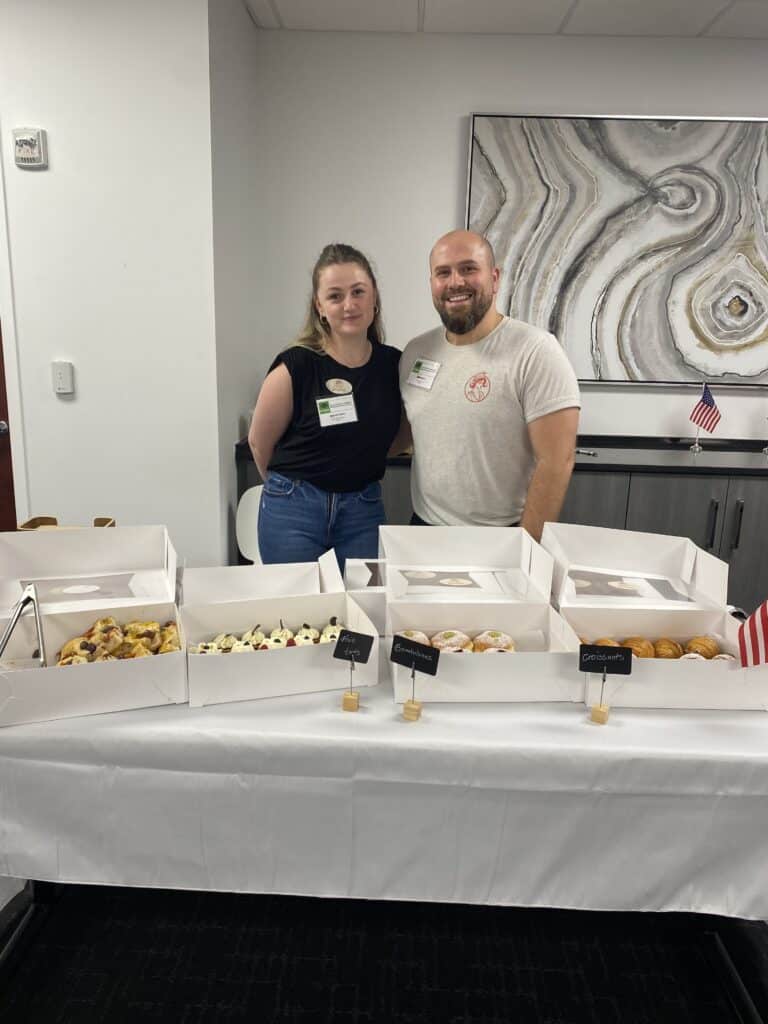

The inspiration behind the event
With a (very) full stomach, I caught up with PCBA President Lisa Proctor to talk about the event.
“We knew that COVID was really hard on a lot of our restaurants to get people back in,” said Proctor. “We wanted to do it in June because we wanted to celebrate our military. Everybody remembers them maybe on Memorial Day or different things, but June is the 80th anniversary of D-Day.”
“The military is always close to our heart,” she added. “We’re also very proud of our restaurants. They all have gone above and beyond.”
Tonight, the PCBA was honoring the Armed Forces and its brave veterans while bestowing two donation checks to very worthy causes.
The first check for $500 went to Folds of Honor. Since 2007, Folds of Honor has provided life-changing scholarships to the spouses and children of America’s fallen or disabled military. And now, their mission expands to the families of America’s first responders.
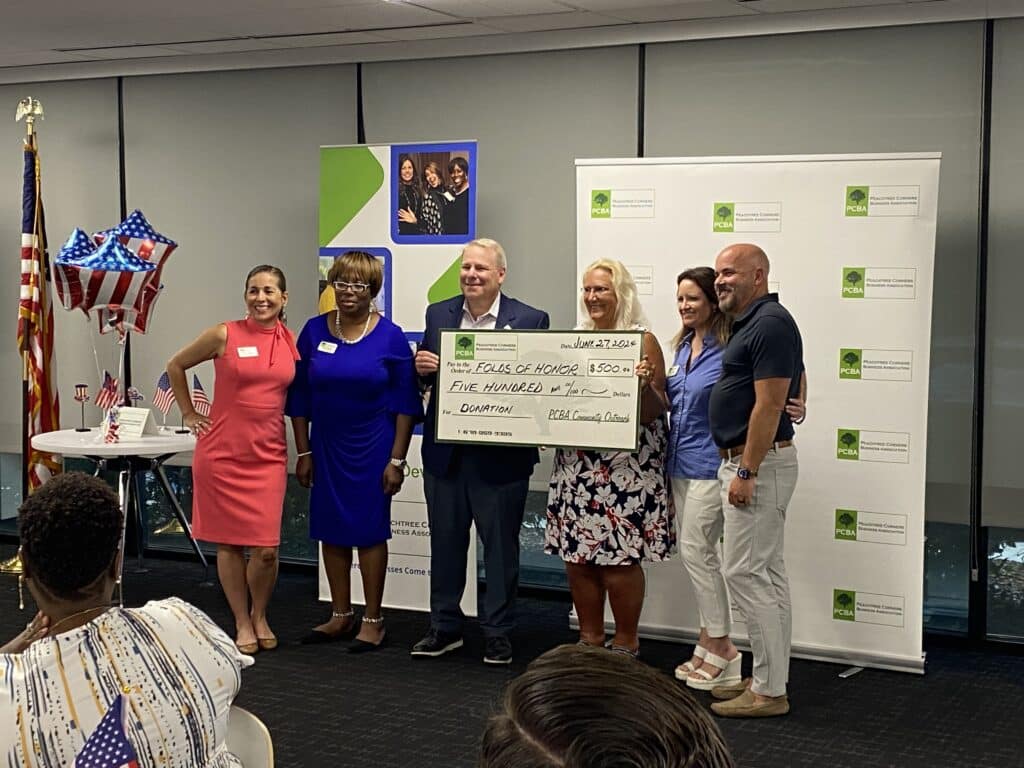
The second check for $500 was given to Light Up the Corners, a 501(c)(3) volunteer organization with an annual glowing, flashing, blinking, shining, nighttime running party and fundraiser in one. All proceeds from the event go to benefit less fortunate children and families in the Peachtree Corners community who are struggling by giving them the chance to participate in life-enhancing programs and activities at the Fowler YMCA.

Over the past 12 years, the PCBA has awarded 19 scholarships and donated more than $156,000+ back to the Peachtree Corners community.
Related
Business
Local Resident Opens AtWork Location in Peachtree Corners
Published
2 weeks agoon
July 10, 2024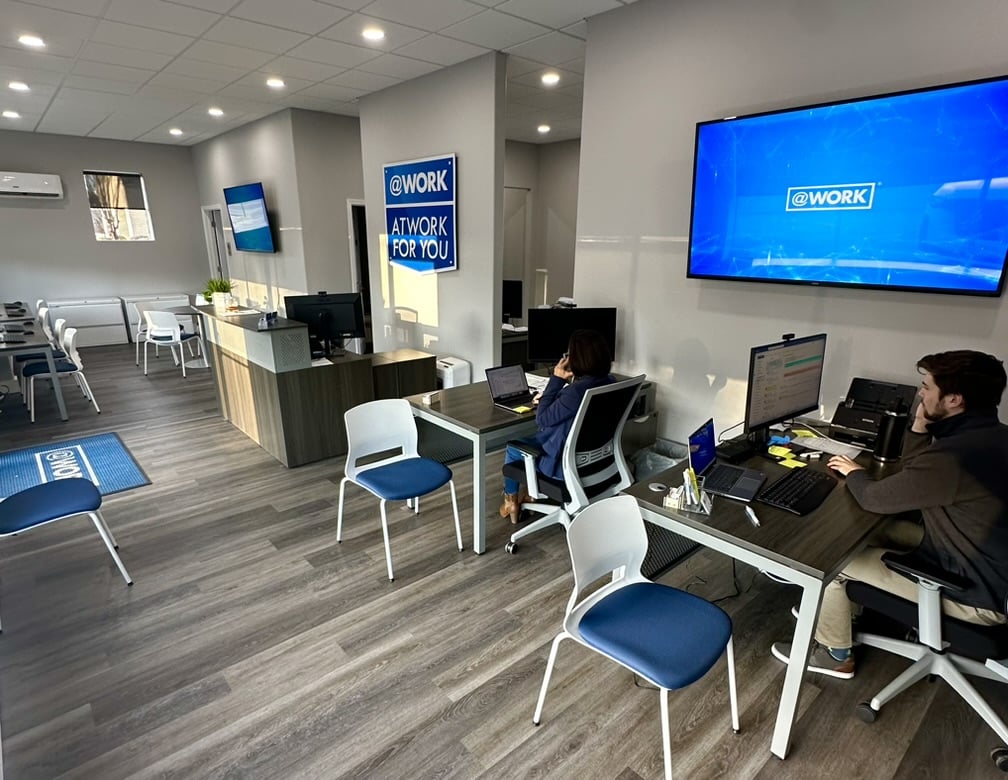
AtWork, one of nation’s leading staffing franchises, has opened its third Metro Atlanta location in Peachtree Corners, Georgia at 6185 Buford Highway, Suite E-100.
AtWork Peachtree Corners is locally-owned by Kamal Bhatia, an immigrant from India with decades of experience in hospitality and as the Senior Vice President of Operations of Atlanta-based Action Bartending School.

“There is an incredible need for AtWork’s services in Peachtree Corners,” said Bhatia. “Since migrating here in 1996, I’ve witnessed Atlanta evolve and sprout new communities north of the city, including my own. Peachtree Corners has become a hub for thriving businesses, and my goal with this location is to be a key resource between companies and job seekers to support the continued growth of our local economy.”
Bhatia’s son and daughter will assist him in the business.
“This is an opportunity to create a legacy company to ensure our community is supported for generations to come,” he said.
For more than three decades, AtWork’s mission has been to connect people with jobs and jobs with people. With more than 100 locations nationwide, AtWork puts nearly 40,000 individuals to work each year in administrative, light-industrial, accounting and finance, hospitality, IT and management-level positions at some of the nation’s largest and most recognizable companies.
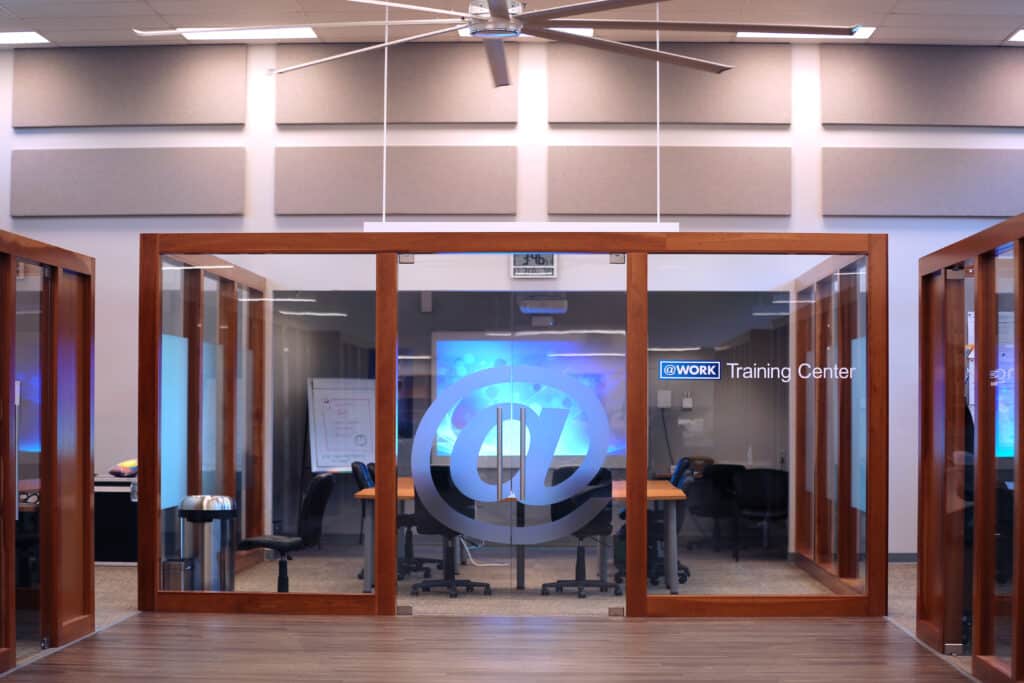
“We’re proud to open our doors in Peachtree Corners and provide a common place for both job seekers and growing businesses to turn for staffing solutions,” said Jason Leverant, President and COO of AtWork.
“AtWork will serve as a key resource to help employees thrive, businesses prosper and communities flourish. Kamal is the perfect partner to champion our mission and be a servant leader in her local community,” he added.
Related
Read the Digital Edition
Subscribe
Keep Up With Peachtree Corners News
Join our mailing list to receive the latest news and updates from our team.
You have Successfully Subscribed!

What’s going on at Jones Bridge Park and the Challenges of Urban Development

Taste of Peachtree Corners: PCBA Showcases Local Restaurants

The Forum Gives Sneak Peek of New Eateries and Community Spaces

Southwest Gwinnett Mayors Share Visions for the Future

8 Events Happening In and Around Peachtree Corners This August

Peachtree Corners Shines Bright with Light Up the Corners Glow Race this August

Peachtree Corners Shines Bright with Light Up the Corners Glow Race this August

The Forum Gives Sneak Peek of New Eateries and Community Spaces

8 Events Happening In and Around Peachtree Corners This August

Southwest Gwinnett Mayors Share Visions for the Future

Taste of Peachtree Corners: PCBA Showcases Local Restaurants

What’s going on at Jones Bridge Park and the Challenges of Urban Development

Local Resident Opens AtWork Location in Peachtree Corners

CHRIS 180 Expands its Services into Gwinnett County [Podcast]

Light up the Corners [Video]

Capitalist Sage: Business Leadership in Your Community [Podcast]

Cliff Bramble: A Culinary Adventure through Italy

Top 10 Brunch Places in Gwinnett County

A Hunger for Hospitality

THE CORNERS EPISODE 3 – BLAXICAN PART 1

Top 10 Indoor Things To Do This Winter

The ED Hour: What it takes to Remove Barriers from Education
Peachtree Corners Life
Topics and Categories
Trending
-
Business1 week ago
Taste of Peachtree Corners: PCBA Showcases Local Restaurants
-
Business2 days ago
The Forum Gives Sneak Peek of New Eateries and Community Spaces
-
City Government4 days ago
Southwest Gwinnett Mayors Share Visions for the Future
-
Around Atlanta4 days ago
8 Events Happening In and Around Peachtree Corners This August







